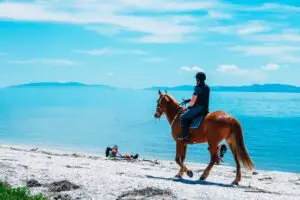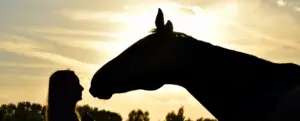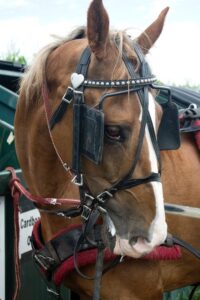Before taking part in any sporting event, nutrition must be taken into serious consideration. Horses need to eat the right food and have the right diet so they can have enough energy and strength to run in equestrian sports. Horses have a very specific dietary requirement as they are herbivores and have a unique digestive tract.
Their long digestive system requires a high-fiber diet, that is consumed in small amounts over a long period. This article will focus more on horse nutrition and the foods that keep horses healthy. A horse should eat 1.5 – 3g of its weight of dry matter per day.
The Natural Diet
The natural diet of the horse is pasture grass and tender plants. Good pasture contains most of the nutrition a horse requires to be healthy. This also contains silica, which is important for dental health. Primitive horses can live on sparse rations and often have to make to with less than ideal pasture and living conditions and this is why problems like obesity, equine metabolic syndrome, and laminitis are rare in wild horses but, they occur frequently in modern horses.

Though pasture grass may not necessarily be the problem, the type of horses and the lack of exercise is. In equestrian sports such as show jumping, horses need to generate the correct speed, energy, time, and height to jump over fences.
If not incorrectly, horses would come in contact with the fences, resulting in injury therefore, exercise, rest, and nutrition are the three most important points riders and horses must take into consideration.
Hay
The grass is important but, hay can also be an excellent option for horses. In the past, hay was mainly a substitute for grass, especially to provide the livestock feed in the winter. Today, most horses eat hay all year rounds and what applies to grass can also apply to hay and silage.
Coarse hay with long stems that smells spicy and light green to yellow is the healthiest for horses. Coarse fiber-rich hay that’s harvested from meadows where grass could grow long is good for the horse. There are many advantages to hay as this is fairly consistent in quality and a horse can eat it without restrictions.
Fruit and Vegetables (well, some!)
Fruit and veg can add moisture to the feed – just eating hay can be a dry meal for a horse. A popular vegetable with horses is a carrot. However, too much fruit can cause colic, obesity, and may lead to serious health problems, including the painful foot problem laminitis.
You should not feed your horse more than 1 or 2 wedges of fruit, for example, an apple, or 1 or 2 carrots, per day. Fruits with stones in such as peaches should also be avoided as this could cause the horse to choke.
Vegetables in the cabbage family, including turnips, cabbages, kale, broccoli, brussels sprouts, will make the horse very gassy and in discomfort so avoid these vegetables all together.
Grains and Oats
Horses need to eat many things as they have a very specific dietary requirement. Beyond grass, Oats are a traditional grain fed to horses however, horses may also be fed small amounts of other grains like corn.
Some grains, like wheat, aren’t good for horses and the seed head of grasses would be the closest thing a wild horse would come to eating grains in their natural environment.

Grains that are grown, harvested, and processed are not natural foods for horses.
It’s easy to feed too much grain to horses and grain, at the same time, doesn’t require chewing time or contains the silica grass and this can contribute to things like ulcers and dental problems.
Supplements
Supplements such as salt and minerals may be included in a concentrate mix or may be offered separately. A loose salt in a pasture or stall allows horses to help themselves when they have a craving.
When talking about a concentration mix, this can include things like grains, flaxseed, and beet pulp. These mixes help make up for any shortfall in nutrition and provide a quick source of energy. Mares in foal, nursing mares, performance, or working horses often benefit from being fed concentrates in addition to grass or hay.
When Should Horses Eat?
Horses should eat constantly as their gastrointestinal tract is designed to always be digesting small amounts of forage as they graze nearly around the clock. The equine liver is continuously secreting bile and since there’s no gall bladder to store it (in a horse), the bile is continuously delivered into the small intestine directly from the liver.

In terms of a horse’s stomach, this constantly produces acids for breaking down foods and activating enzymes for digesting protein. The horse’s stomach is relatively small and can only hold so much at one time.
Lucerne
Finally, Lucerne is a leguminous crop that is fed dried and chopped to horses. This is mainly fed with hay. Due to the plants’ fast-drying process, the nutritional value is retained and these digests easier in horses. Lucerne may contain little sugar however, this also contains enough minerals, vitamins, and trace elements and because the digestibility of the proteins is so high, horses will fertilize much less when chewing on lucerne.
Another important point to take in is that the proteins in lucerne provide good support in building muscles. That’s why this was initially used a lot for sport horse. It’s also better to give roughage than concentrate and due to the low sugar and starch content and the high feed value, it is an excellent concentrate feed replacement.
In conclusion, horses need to eat constantly and by eating the right foods, horses can adapt and generate enough energy to perform well in equestrian sports. Horses have a very specific dietary requirement as they are herbivores and have a unique digestive tract, therefore, it’s important that they are fed the correct food and that this falls in line with their dietary requirement.

